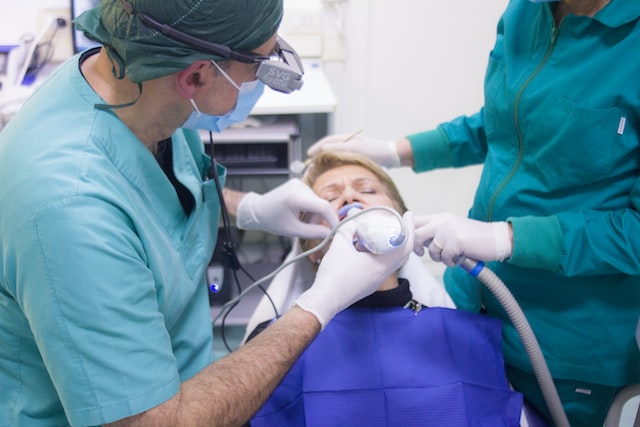
Also known as your third molars, wisdom teeth are the last permanent teeth to erupt in your mouth. These will typically come in around the ages of 17 and 25, once childhood is over. In the modern age, we no longer need these teeth. Many generations ago, our ancestors had a primitive diet that required an extra set of molars in order to grind certain foods. As dietary needs adapted, the human body went through gradual evolutionary changes, including the reduction of our jaws. Now, many people do not have space for wisdom teeth to properly grow, making extraction necessary.
The odds are, you know someone—possibly several someones—who has undergone wisdom teeth removal surgery. It is an incredibly common procedure that oral surgeons around the world are expected to be familiar with. Still, there is a considerable amount of misinformation out there about what the surgery entails. Check out eight wisdom teeth removal surgery myths you should ignore.
Wisdom teeth removal surgery is such a common practice that you may believe every adult grows these molars. The majority of people do have four wisdom teeth. However, research shows that anywhere between 5% to 37% of people are missing one or more of their wisdom teeth. As mentioned previously, the reason for this comes down to evolution. The human mouth has changed significantly over the course of thousands of years. Because wisdom teeth have become vestigial (functionless), they are slowly going away.
For those whose wisdom teeth never fully emerge, dentists recommend an extraction. If your wisdom teeth have fully erupted and are healthy, you may not need to undergo surgery. Should this be the case, you simply need to ensure that you are taking care of them with daily hygiene practices, the same way you do with your other teeth. But, if you do need to get the procedure done, whether it be for one or four of your wisdom teeth, know that it will be over before you know it.
Some patients get braces before their wisdom teeth have even started to show signs of growth. For those who are showing signs of growth, however, it is up to the opinion of the orthodontist whether you should get them removed first. They will know whether your wisdom teeth could prolong or ruin the progress of your braces.
The majority of those who undergo wisdom teeth removal surgery experience little to no pain. Your oral surgeon will provide you with sufficient anesthesia to ensure that is the case. You may have seen videos in the past of people after their surgery. Perhaps you have even driven someone to and from their procedure. The anesthesia is where any “loopy” behavior comes from. While you are likely to experience discomfort after your anesthesia has worn off, your oral surgeon should set you on the path to achieving wisdom teeth removal pain relief. With the help of medication, compresses, and the right food, you do not have to worry about pain.
Wisdom teeth removal surgery can be a nerve-wracking experience for those who aren’t sure what to expect. The anxiety that stems from this may result in you postponing your extraction. Be aware, though, that many dentists believe that it is better to remove wisdom teeth before the roots and bone are fully formed. This means taking care of them before they start causing you discomfort. Your dentist will not be able to predict when or if your third molars will erupt, so removing them as early as possible is in your best interest.
Even for those who do not have trouble with their wisdom teeth, it is important to note that these molars have the highest rates of decay and gum disease. While they may appear to be asymptomatic right now, it is something to keep an eye on. Your wisdom teeth have the potential to develop cysts, cavities, or pericoronitis (inflammation around the crown of the tooth). Impacted wisdom teeth can also cause damage to your other teeth, negatively impacting any previous orthodontic work.
It is recommended to not brush your teeth immediately after surgery. But don’t give up on your oral hygiene routine! You are going to need to make sure that your mouth is especially clean following wisdom teeth removal surgery. It will be a problem if you end up getting food particles stuck in your wounds. Be gentle when you are brushing your teeth and rinsing your mouth. Your oral surgeon should provide or point you to the appropriate mouthwash to use during recovery, and they will inform you not to spit when you are rinsing.
Some people will swell more than others and for a longer period of time. That being said, when you execute proper aftercare, it should only take you about two weeks to recover from your extraction. During this time, you can expect to gradually work back up to eating your regular diet. Once those two weeks have passed, you are welcome to participate in strenuous exercise and drink from a straw again. If you experience any complications over the course of your recovery, including trouble swallowing or breathing, seek help from your oral surgeon immediately.
Wisdom teeth removal surgery can be nerve-racking. But when you are in the good hands of Dr. Jeff Alford, there is little to be nervous about. He stays up to date with the latest advances in surgical techniques to provide you with the smoothest procedure. Under Dr. Alford’s guidance, you will also reap the benefits of a clear plan for wisdom teeth removal pain relief. Get in touch with us to learn more about our services offered in the heart of Texas. We are located in both Bastrop and Lake Travis.